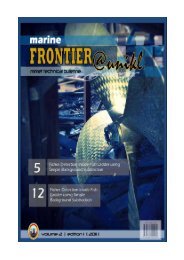click here to download - UniKL MIMET Official Website
click here to download - UniKL MIMET Official Website
click here to download - UniKL MIMET Official Website
Create successful ePaper yourself
Turn your PDF publications into a flip-book with our unique Google optimized e-Paper software.
capable professionals <strong>to</strong> meet Malaysia’s indus‐<br />
try needs, it has been decided that the focus<br />
should be on a local technical university. Uni‐<br />
versity Kuala Lumpur (<strong>UniKL</strong>), that was founded<br />
through a national agenda <strong>to</strong> upgrade the status<br />
of technical education in Malaysia <strong>to</strong> a level that<br />
can help meet the needs of local industries and<br />
sustain Malaysia’s economic growth <strong>to</strong>wards a<br />
developed‐nation status by year 2020 is consid‐<br />
ered suitable for this study. A study of the or‐<br />
ganizational culture of <strong>UniKL</strong> was chosen be‐<br />
cause it is a good example of an educational or‐<br />
ganization that has managed <strong>to</strong> go through an<br />
organizational culture transformation from a<br />
traditional <strong>to</strong> a performance‐driven culture. It is<br />
t<strong>here</strong>fore most appropriate that lessons learnt<br />
from this transformation be shared for the bene‐<br />
fit of everyone.<br />
UNDERSTANDING OF HIGH PERFORMANCE<br />
CULTURE (HPC)<br />
Organizational Culture, in simple term, is the way<br />
organizational members do things in their or‐<br />
ganization. It is a system of shared meaning held<br />
by members that distinguishes the organization<br />
from other organizations (Robbins and Judge,<br />
2009). Culture drives an organization, its actions<br />
and results. It guides how employees think, act<br />
and feel. It is the "operating system" of the<br />
company, the organizational DNA. A perform‐<br />
ance culture is based on discipline. This disci‐<br />
pline promotes decisiveness and standards of<br />
excellence and ensures direct accountability.<br />
Such discipline is a main reason why commit‐<br />
ments and expectations are always clear. As<br />
such, high performance organization is one that<br />
gives more focus and commitment <strong>to</strong> achieve<br />
better results through a performance ‐ driven<br />
culture.<br />
<strong>MIMET</strong> Technical Bulletin Volume 1 (2) 2010<br />
MAKING HIGH PERFORMANCE CULTURE WORK<br />
Four basic fac<strong>to</strong>rs that contribute <strong>to</strong>wards making<br />
high performance culture works at <strong>UniKL</strong> have been<br />
identified. Although these fac<strong>to</strong>rs are commonly<br />
found in most organizations, it is appropriate that<br />
they are further elaborated for better understand‐<br />
ing. The fac<strong>to</strong>rs are as follows;<br />
Openness and trust:<br />
When t<strong>here</strong> is openness and trust, frankness<br />
prevails. Frankness is encouraged because it<br />
implies a willingness <strong>to</strong> speak the unspeakable.<br />
An environment of trust reduces defensiveness<br />
when issues are raised. People react more hon‐<br />
estly, ask questions more frequently, and are<br />
more spontaneous with their comments and<br />
ideas. The organization derives greater value<br />
from its talent, and employees get <strong>to</strong> develop<br />
their competence and contribute <strong>to</strong> success.<br />
Managed differences:<br />
Interpersonal differences result in conflicts. Con‐<br />
flicts are addressed and unfulfilled commitments<br />
are exposed. This results in better ability <strong>to</strong><br />
learn from the conflicts and take proactive action<br />
<strong>to</strong> correct potential differences. Alternatives and<br />
options are looked at without a pre‐determined<br />
outcome when people become less presumptu‐<br />
ous. People express real opinions and move be‐<br />
yond the perceived "safe talk." Issues can then<br />
be resolved more effectively.<br />
Simplicity and focus:<br />
Making things simple, less complex and being<br />
more focused ensures precise focus is directed<br />
<strong>to</strong>wards implementation of objectives with clar‐<br />
ity and precision that define what needs <strong>to</strong> be<br />
accomplished and how <strong>to</strong> accomplish it. T<strong>here</strong> is<br />
a commitment at all levels <strong>to</strong> remove, not add,<br />
complexity from the way of doing business. Be‐<br />
ing result‐driven and having fun are not seen as<br />
| MARINE FRONTIER @ <strong>UniKL</strong><br />
98



